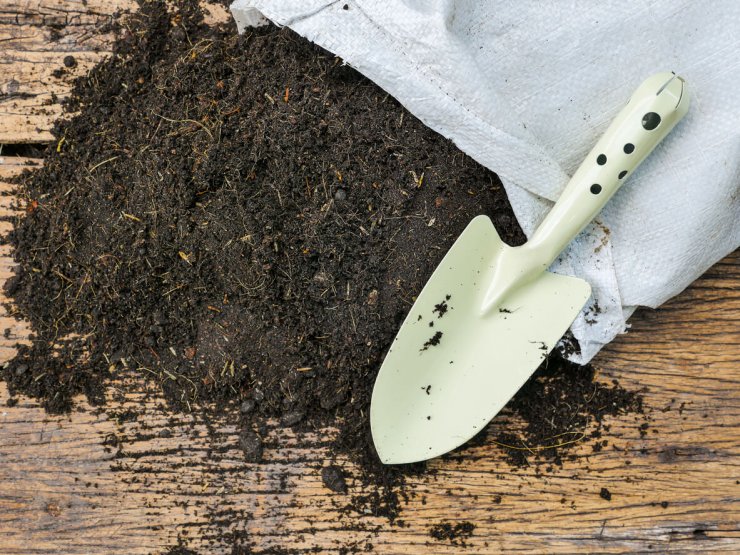
Bag of gardening soil
Having healthy tomato plants starts with having great soil in which to grow them, and there’s nothing like good old-fashioned compost to give your plants some of the organic materials they need to thrive.
You don’t really want to grow your tomato plants in 100% compost. Pure compost lacks some of the minerals that tomatoes need to grow and thrive. A 30% mix of compost with your overall soil is a good balance. Buy a soil mix that includes granite dust to mix with your compost and top soil—10% soil mix with your 30% compost should combine with 60% of the remaining top soil you already have.
And it’s alright if you don’t make your own compost—you can buy bulk compost from most gardening supply stores. Try to find “certified compost” with the U.S. Composting Council’s Seal of Testing Assurance (STA)—their rigorous testing process and standards will ensure you get quality compost.
Next, consider adding a timed-released fertilizer and worm castings as healthy amendments to your soil. With your compost and amendments on top of your soil, use a spade fork to turn the soil over and mix everything together.
Remember, soil health is one of the most important things to ensuring that your tomato plants thrive and produce quality and quantity fruit.
When it comes to planting tomatoes with other plants, here are some plants that tomatoes like to share space with. Be sure to give tomatoes plenty of space of their own, but you can plant these nearby:
- Basil
- Borage
- Carrots
- Impatiens (serve as good indicators for necessary watering)
- Lettuce
- Nasturtiums
- Marigolds
- Parsley
And here is a list of plants to keep away from your tomatoes:
- Corn
- Brassicas (mustard family of plants, such as cabbage, broccoli, and cauliflower)
- Potatoes
- Eggplants
- Peppers
What type of soil do you use to grow your tomatoes? Do you use compost at all? What are your best tips for creating optimal soil for your tomatoes? Please share your techniques with us.


 Previous
Previous


This is my first year planting tomatoes in an in-ground garden. I also planted broccoli and Brussels sprouts in the same garden. Your article says not to plant these together. Are my tomatoes doomed??
I have a greenhouse and plant tomatoes, peppers and corn with success.
I am an organic gardener and choose not to fertilize with commercial products. You do not mention adding things like Epsom Salts etc. Could you write something about that?
Sure! Here’s something we’ve published in the past: https://foodgardening.mequoda.com/daily/soil-fertilizer/how-to-make-the-best-all-purpose-plant-fertilizer-with-3-or-fewer-simple-ingredients/